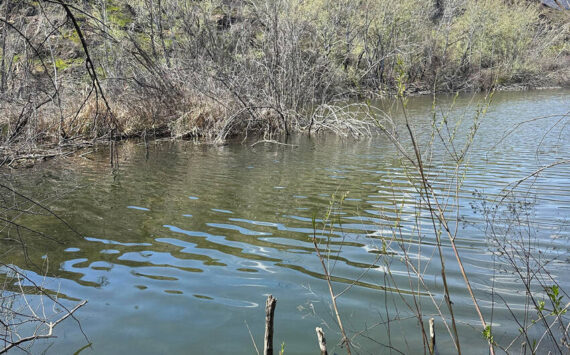OROVILLE – Just when it seemed Oroville’s sidewalk project along Highway 97 had stumbled due to a lack of state funding, the recently approved federal stimulus package could get the project up and on its feet again.
“A week ago we got an email from the TIB saying they would no longer be able to fund out of their dollars due to the economy and lower gas tax revenue,” said Rod Noel, Oroville’s Superintendent of Public Works, reporting to the city council at their Tuesday, March 3 meeting.
The TIB, or state Transportation Improvement Board, had verbally agreed to help the city partially match federal funding that would install sidewalk and other pedestrian improvements between Appleway and the Oroville Station of the U.S. Border Patrol and from the USBP office south down the east side of Highway 97 to the city limits.
While a verbal agreement was enough in the past, representatives of the TIB told Noel that the state would not be able to fund any project not actaully contracted. Noel said he notified the city’s engineers, USKH, to stop work. However, they had already done $15,000 worth of work, according to Noel.
The first phase of the two phase project will cost $940,000 and the federal government agreed to pay 86 percent and the state was going to pick up most of the rest.
“Without the state funding it would have left us to pay $120,000 to fund the project,” said Noel.
Noel reported he then spoke with the regional engineer from the state Department of Transportation who told him the state had toll credits to help fund federal projects. He said if the city could come up with 13.5 percent for design money it may be able to help fund the rest not funded by federal monies.
Noel said 13.5 percent of the design would add up to about $20,000 and since the city was already into the engineers for $15,000, whether the project goes ahead or not, it might “behoove” the council to find another $5000 to help proceed with the first phase.
“Then we were notified that the county would get $1.4 million from the American Recovery and Renewal Act. We rank third after Omak and Conconully for projects that are ready to go. So we may apply for gap money,” said Noel, saying if Oroville was approved it would try to complete both phases of the nearly $1.9 million project.
“We got another verbal commitmet that if we get stimulous money they, the TIB, would fund the city’s $23,000 total share,” Noel said.
Councilwoman Neysa Roley made a motion approving the city’s application to the county for stimulous funds and it was seconded by Councilman Walt Hart III. The motion was carried.
“If we do not get stiumulous funds, then our share could come out of the Special Arterial Street fund,” said Noel. “We should get notification of project selection probably next week.”
Oroville’s City Hall Project is also struggling to get funding, but the outlook isn’t as positive. City Clerk Kathy Jones reported that she was still checking in to potential stimulus money to help get the expansion and remodel completed.
“I have had a call from U.S. Bank and they said they are there, but that would add about a million dollars in interest,” Jones said. “Our bond is about 78 cents per $1000 and I’m not sure we would want to do that.”
Yet another project the city is trying to fund has to do with biosolids at the wastewater treatment plant. The city wants to install a press and other equipment that would allow the biosolids to be treated in such a way as to meet stricter Department of Ecology standards. Currently the city takes the treated biosolids and spreads them on city property near the airport.
Noel said Ecology would like a greater treatment of the biosolids. One way to do so is to truck them to a facility that treats them to the point they are state approved for use on wheat fields.
“I guess they can really grow wheat with the stuff, but we really don’t have that many wheat fields around here,” said Noel after the meeting, explaining that farmers can use the biolsolids rather than petroleum-based fertilizers.
This would be an expensive option as the facility is over 100 miles away. Another option is to treat them on site to an even higher standard where they are state approved to be used in people’s gardens as a replacement for other types of fertilizers.
“People might think that we have to make these improvements because of the addition of the Eastside Sewer Project,” said Noel, “when in actuallity we have been marking time until the day Ecology said we could no longer do the spreading up at the airport. The fact that we have more customers now will mean we have more people to help pay for the improvents.”
The Eastside Sewer also brought Public Trust Fund monies to Okanogan County which paid to construct the new sewer line serving residents and developments on the east side of Lake Osoyoos. Some of those Public Trust Fund monies may still be available to loan to the city at low interest rates to help fund the over $1 million project, according to Noel.
“And like the street project we are trying to hussle some stimulous dollars. The Public Trust Fund is alreay in place as well,” he said.





